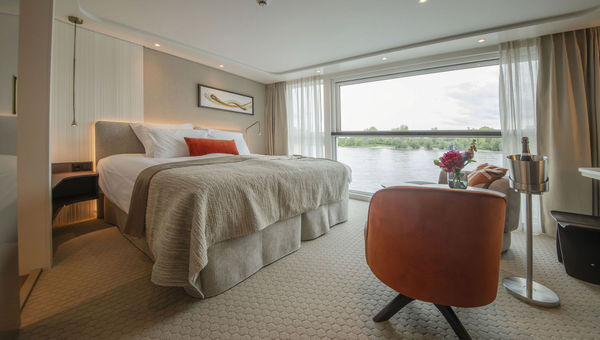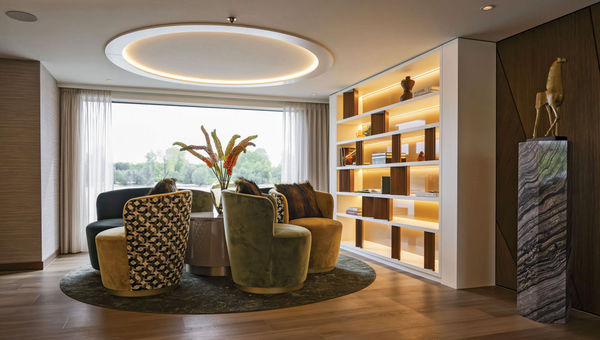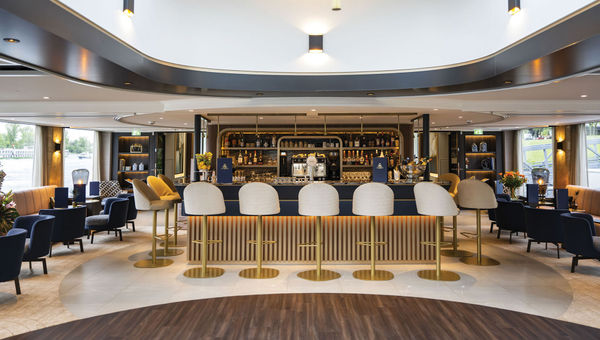A cruise line with Dutch roots that launched last year on European rivers has begun to market its cruises in North America.
The single-ship Van Loon Cruises debuted in 2024 on the Rhine and Moselle rivers with its 172-passenger newbuild called The Gentleman. It has commissioned a second similar ship, called The Nobleman, to be delivered in 2026.
Last year, the brand marketed to customers from Germany, Switzerland and Norway. This year, it expects to have Americans onboard during two months of full-ship charters.
Van Loon hopes its edge will be the contemporary look of its ship and the quality of the craftsmanship, materials and engineering.
"It's different from others. It's a modern ship," said sales and marketing vice president Jasmijn van Loon, who along with her father, Arjan, forms the senior management team.

The Gentleman's eight large suites are decorated in beige with orange and coral accents. Photo Credit: Van Loon
Although it has the standard dimensions of a European river cruise vessel, on The Gentleman, the design inspiration comes from the ship's interior look rather than a nautical or maritime theme, according to van Loon.
"The interior is hotel chic -- warm colors," she said. "It's not the ship you think about when you think of the gray image of river cruising. It's a very modern ship, with the cleanest diesel engines."
Cabin decor is beige with orange and coral accents, while public areas feature stone and wood detailing. Amenities include two restaurants, a wellness center/gym, a tour desk, an elevator and a sundeck.
Van Loon has roots in shipping
The cruise line is an outgrowth of the van Loon family business of tanker shipping on inland waterways in the Netherlands. The original branch of the company, Van Loon Shipping, has a fleet of seven tankers that carry liquid minerals and chemicals. It is managed by Jasmijn van Loon's two brothers, while she and her father focus on the new venture.

The Gentleman's eight large suites are decorated in beige with orange and coral accents. Photo Credit: Van Loon
Van Loon said that being a small, family-owned company has benefits for clients.
"We have direct communication and quick decision-making. You see a few players in the river cruise industry, which are big. That's a different way of working. When clients are talking to us, they're talking directly to the owners," she said.
The cruise line also has flexible itineraries, developed in consultation with tour operators, van Loon said.
Over the summer, Van Loon Cruises offered a Holland-Belgium itinerary that was assembled around an open-air concert in Maastricht, Netherlands, by renowned Dutch violinist Andre Rieu. The company bought tickets, and The Gentleman docked less than half a mile from the concert site, enabling passengers to easily walk to and from the venue.
"That's an advantage of our company," van Loon said. "We are flexible. We don't have strict itineraries yet."
Van Loon started marketing in the U.S. last year, making a virtual presentation at the inaugural ASTA River Cruise Week event in November and attending the USTOA conference in Marco Island, Fla., meeting individually with tour operators.
Collette has already signed on for a Dutch tulip cruise in April. In addition, the new groups-only river line Transcend, which is building its own ship, this year chartered The Gentlemen for several cruises. "They don't have the ship, but they have sales," van Loon said.

The Gentleman features a two-deck lounge with modern furniture and lots of exterior facing windows. Photo Credit: Van Loon
The Gentleman is one of only a handful of river cruise ships in Europe to have secured a gold-level Green Award from the Green Award Foundation. It's an environmental seal of approval based on emissions control and other factors. Among other benefits, it confers docking rights in center city Amsterdam. "If you don't have the Green Award you can only go to the industrial ports, and you're outside of the center," van Loon said.
Docking on the European rivers can be kind of a scramble at peak times during the summer, so any advantage is a plus.
"The industry is growing and all the companies are building new ships, but there are not extra dockings," van Loon said. "There's a huge lack of dockings, so it's always a big thing to arrange it on time."